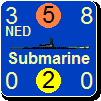yvesp
Posts: 2083
Joined: 9/12/2008
Status: offline

|
quote:
ORIGINAL: composer99
Weird streaks of the dice happen in the tabletop game often enough: one of my fellow local WiF gamers once, when playing Japan in a Global War game, rolled something like 13 consecutive attacks on the 2d10 chart where he got a '12' or worse on the dice before he finally rolled something better, and I've had games where I've rolled hot dice almost the entire game for air combats, and others where I rarely roll out of the average range. I've seen three consecutive 10s rolled on weather rolls on two separate occasions (once in the winter, once in July/August).
Yes, I know. But 4 ones in a row is a 1/10000 event, whereas 13 rolls of 12 or less is 'only' a 1/300 event.
quote:
All that's to say that, given how many dice get rolled (or, in this case, how many random numbers simulating the die rolls get generated), it's no wonder that some fluky streaks happen.
Yes, that's why I'm being prudent: I'm not saying that the dice in Wif are broken! I'm just asking whether they have been statistically checked in some serious way. It should not be two difficult: such checking algorithms are out there, and it doesn't take a master in math to run them and check the results on a table...
The trick is that while it is easy to make a pseudo-random generator that behaves well in number repartitions, it is quite more tricky to get one that behaves correctly in non correlation between consecutive outputs ; and I have observed enough fluky streaks that I am bound to ask the question. Standard 'system' pseudo generators are usually notorious in this way, because it requires a fairly complicated algorithm to get something acceptable.
One way to get a reasonnable generator with no bias is simply not to use a pseudo-generator, but to use the millisecond output of the inner clock ; the current millisecond value is good enough for 1d10 ; the two numbers for the centi and milli second values are good enough for a 2d10 roll. While the game do require a fair number of rolls, it won't roll more than one every second (and that's a fast game!) : so the resulting values are both fair in repartition and uncorrelated in time. Of course, this assumes that the system delivers proper, unbiased, time ; but this is the case. There is a drawback: you can never repeat the same sequence, but we are in a context where that is not needed.
|
 Printable Version
Printable Version



















 New Messages
New Messages No New Messages
No New Messages Hot Topic w/ New Messages
Hot Topic w/ New Messages Hot Topic w/o New Messages
Hot Topic w/o New Messages Locked w/ New Messages
Locked w/ New Messages Locked w/o New Messages
Locked w/o New Messages Post New Thread
Post New Thread